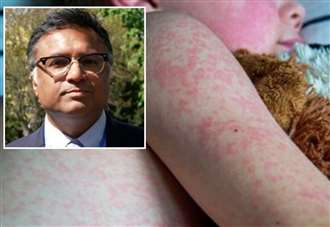Kent’s public health director says anti-vax parents are putting their children’s lives at risk amid worrying outbreaks of measles across the country.
Dr Anjan Ghosh, who holds the role at Kent County Council (KCC), says the number of confirmed cases is at its highest level since 2012 – despite the vaccine being 99% effective against the disease.

He has also warned parents not to take advice from social media, where misleading content and vaccine conspiracy theories are widely shared.
“Anyone can post anything,” he said. “It’s not based on scientific evidence. In this age of AI, it becomes even more convincing, and you just don’t know what you’re reading.
“It might sound authoritative, but it often is misinformation. Please rely on reliable sources of information such as the NHS website, the UK Health Security Agency website and our own website, getvaccinatednow.co.uk.”
The increase in measles cases has been linked to a drop in take-up of the MMR jab since the Covid pandemic.
In 2024, there were 2,911 laboratory-confirmed cases in England – 11 of them in Kent. This is the highest annual number since 2012, with most cases involving children under 10.
In Liverpool, a child recently died from the disease, which is “one of the most infectious in existence”.

Dr Ghosh says that while death is rare, parents choosing not to vaccinate their children are still taking a serious risk.
“They are absolutely risking their lives,” said the 54-year-old. “Death is obviously one possibility. It’s rare, but it can happen.
“But along with that, there are other complications which are less rare – infections, pneumonia, severe diarrhoea and related dehydration.
“Then you can also have less common, but also possible, convulsions and encephalitis (swelling of the brain).
“If you have a child, obviously, you want to do the best for them and keep them as safe as possible.
“Why would you want to put your child at risk, especially if you had the tools to prevent it in 99% of cases?”

Dr Ghosh believes concerns around the Covid vaccine have spilled over into other areas of preventative medicine.
“The MMR has been around since the early 1970s, so it’s almost as old as I am,” he said.
“I think there are a lot of misconceptions and also conflation with COVID vaccination. My message is, please don’t conflate the two.
“This is a set of vaccines that are tried and tested, with a very rigorous history. It’s absolutely essential.”
In 2023/24, 84% of Kent children and 80% of Medway children had both doses of MMR by age five – a slight dip from the previous year but still above the national average. Early 2024 data suggests a small uptick in uptake, KCC says.
“The World Health Organisation target is 95%,” added Dr Ghosh.

“It is an aspiration. We haven’t reached that. The data is suggesting an upward trend, so people are listening and actually acting, particularly parents.
“But we’ve still got a way to go before we reach the 95% target, or even 90%.”
Mr Ghosh stressed it is never too late to get vaccinated, including for adults.
“Even if you’ve missed the vaccination schedule, please do not hesitate to get it done,” he said.
“Measles is also severe in adults. It actually affects adults in a much more serious way than many other population groups.
“All you have to do is contact your GP and see what arrangement can be made to get you a vaccination suitable for your age.”

Children are currently offered the first dose of MMR at the age of one and a second at three years and four months.
From January 1, 2026, children born on or after July 1, 2024, will instead get their second dose at a new 18-month appointment.
Measles usually starts with cold-like symptoms, followed by a rash a few days later. Some people also develop small white spots in the mouth.
The NHS warns it can lead to serious complications if it spreads to other parts of the body, such as the lungs or brain.
These are rare but more likely in babies and people with weakened immune systems.
